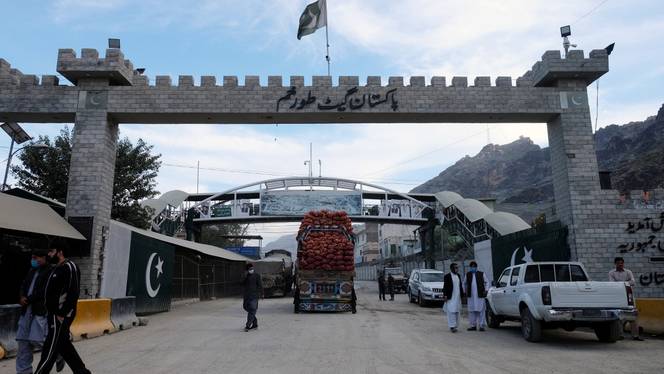The Torkham border, a key crossing between Pakistan and Afghanistan, remained closed for the second day. Pakistani and Afghan border forces stayed on high alert as all trade and passenger movement came to a halt. The border, connecting Khyber Pakhtunkhwa in Pakistan and Nangarhar in Afghanistan, shut down on Saturday due to a dispute over the construction of a new checkpoint.
A Pakistani security official at the border confirmed that no vehicles or passengers could pass through. “Torkham border remains closed for all types of passenger and trade vehicles,” the official said. He added that security forces on both sides were on high alert to prevent any escalation.
No Scheduled Talks to Reopen the Border
Efforts were underway to organize a meeting between border officials, but no flag meeting or border communication committee meeting had been scheduled yet. The official, speaking anonymously, said discussions to resolve the issue had not begun. Authorities on both sides were still trying to establish communication to ease the situation.
Longstanding Border Disputes
Torkham is one of 18 crossings between Pakistan and Afghanistan, but its closure has significant economic and security implications. Disputes over border management and security measures often lead to temporary shutdowns. The border closure disrupts trade and affects thousands of people who rely on daily cross-border movement.
Pakistan and Afghanistan have a history of border tensions, with periodic closures straining relations. The border issue intensified in November 2023 when Pakistan launched a crackdown on irregular migrants. Many Afghan nationals were deported as part of this policy, further complicating diplomatic ties.
Pakistan-Afghanistan Relations Under Strain
Relations between the two countries have remained tense since Pakistan accused “Afghanistan-based” militants of launching attacks inside its territory. Islamabad blames the outlawed Tehreek-e-Taliban Pakistan (TTP) for violence in its border regions. Pakistan claims the Afghan Taliban government has not taken action against these groups, a charge Kabul denies.
The situation worsened in December when Pakistan carried out airstrikes in Afghanistan’s Paktika province. The Afghan Taliban accused Pakistan of killing 46 people, including women and children. Islamabad rejected the claim and insisted that its operation targeted militant hideouts.
Impact on Trade and Security
The Torkham border is a major trade route, and its closure impacts businesses on both sides. Afghanistan relies on imports from Pakistan, while Pakistani traders face losses due to halted exports. The shutdown also increases security risks, as tensions at border crossings can escalate into armed clashes.
With no talks scheduled, uncertainty remains over when the border will reopen. Diplomatic efforts will be crucial in preventing further deterioration in Pakistan-Afghanistan relations. Meanwhile, security forces on both sides continue to maintain high alert, anticipating any potential flare-ups.
Related Stories:
Pakistan’s Exports to Afghanistan Surge by 92% in Ten Months
Pakistan’s Khyber Pakhtunkhwa Plans Delegations to Afghanistan for Diplomatic Talks
Pakistan claims TTP launched 22 attacks from Afghanistan’s soil in two weeks
















